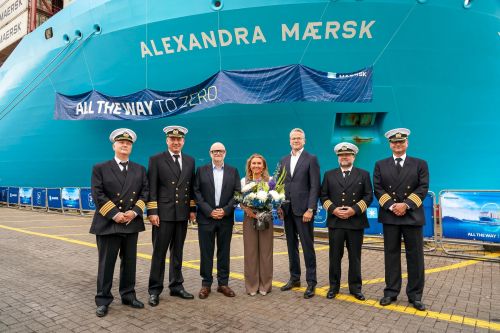Feature, Freight News, Sea
Maersk Alexandra starts shipping giant’s long voyage to zero emissions
[ October 9, 2024 // Chris Lewis ]AP Moller-Maersk named its fifth large dual-fuel methanol vessel at a ceremony in Felixstowe on 9 October, but putting new tonnage into service is only the start of what promises to be a long and challenging voyage to zero-emission shipping.
The Maersk Alexandra, named after a matriarch of the Danish AP Moller family, is a 16,500teu ship, was christened by ‘godmother’ Elaine Condon, whose day job is director of people and culture at Primark, a major customer of Maersk’s Far East trades on which the ship will be a regular performer.
Eventually, Maersk plans to introduce a fleet of 170 clean vessels worldwide.
However, while the ship uses complex technology to burn methanol, clean diesel or conventional maritime fuel in the same engine, at the moment the scarcity and expense of methanol means that its use will be limited for the time being.
However, could change as more methanol bunkering becomes available.
The Alexandra was able to perform the leg from Tanger Med in Morocco to Felixstowe entirely on methanol, but this could be a one-off event until regular methanol bunkers are available, and at an affordable price. It’s not clear how keen large customers operating on tight margins will be to pay even more for freight charges, which have already surged due to geopolitical events such as the diversion of ships away from the Red Sea.
AP Moller-Maersk chief executive Vincent Clerc told the gathering that he would be urging the International Maritime Organisation (IMO) “to close the price gap” between conventional fuel and greener alternatives. Good progress has been made at a meeting that week but more work was needed to secure an agreement, he said.
However, the Alexandra does prove that the technology works and, as shipping minister Mike Kane said at the christening, it is “exactly the kind of innovation we need to deliver a greener, cleaner maritime sector which is better for people and for our planet”.
Maersk Alexandra crew members were enthusiastic about their new charge, saying that the methanol propulsion system worked faultlessly and that the switch between the two types of fuel was almost unnoticeable. Methanol-powered ships could also create a cleaner working environment in what up to now has been a rather oily industry.
Mike Kane told a press conference that the new Labour administration would be an “mission-led” government and that the UK would use its standing as a maritime nation to push for a green shipping agenda. He added that with the price of methanol currently two- or three times that of conventional ‘black’ fuel, this was one issue that the IMO was currently addressing. “Should Maersk suffer because they are doing the right thing?” he asked. One possible solution might be a surcharge on conventional maritime fuel to bring its price up to that of greener alternatives, although how that would be received by shippers already grappling with near-record shipping rates is a moot point.
One complaint from the shipping industry is the multiplicity of different green fuels and propulsion systems, making it hard to decide which technology to invest in. However, the minister did not envisage that his government, or other world governments, would try to dictate to the shipping industry which green energy it should adopt.
One other issue that the minister is determined to address is the supply of electricity to ports for shore power. “We have to improve the grid to our coastal communities, and we have established a working party to address this,” he said. He pointed that half of the UK’s maritime emissions come from vessels berthed in ports.

Tags: Maersk










